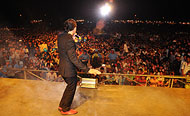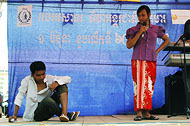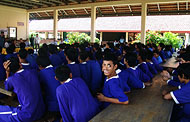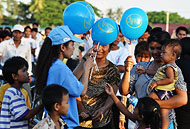Published on June 30, 2009
I get up at 5:30 a.m. so I can let the dogs out of the house. Then I clean the dog droppings, wash the dishes, and prepare food for the dogs. At around 8 a.m., I have to leave the house to work at the private school that my employer runs. I also bring clothes which need cleaning with me so I can hand-wash them. After I arrive at the school, I have to go to the market, help with the cooking, and prepare lunch for my employer. Then, I do the washing-up and clean the school building and the clothes. In the afternoon I also have to tend to the bikes of the students who study at the school.
At about 7 p.m., I return to the house. I cook dinner and do the washing-up. Sometimes, I have to clean the remaining clothes. Frequently, I am not able to go to sleep until 11 p.m. or later. Sometimes my employer's son goes out at night, so I have to wait up to open the door for him at 2 a.m.
Sometimes, when the dogs bark at night and wake my employer, he blames me for it, saying that I am unable to control them. He shouts at me, insults me, and also slaps me. My work is like this every day of the week.
This is the story of a 16-year-old domestic worker and the conditions she works and lives in. Her story is shared by thousands of exploited children across Cambodia. A 2007 study commissioned by LICADHO and World Vision Cambodia estimates that there are 21,000 child domestic workers, mostly girls, in Phnom Penh and Cambodia's three largest provinces (Kompong Cham, Battambang, and Siem Reap) alone.
World Day Against Child Labor
To celebrate World Day Against Child Labor on June 12th, LICADHO in collaboration with World Vision Cambodia organized a large public concert at Kompong Cham Stadium in Kompong Cham Province. The purpose of the concert was to raise awareness about the dangers facing children engaged in domestic labor. The event focused on the need for children's education, healthcare, and protection from physical, psychological, and sexual abuse and exploitation.
In Cambodia child domestic labor is largely the result of poverty. Poor families often resort to removing their children from school and sending them out into the workforce to earn money or offer their services as payment for debt. For child domestic workers, working conditions can resemble slave labor. Children may work 16-hour days cooking and cleaning, and are vulnerable to physical, sexual and psychological abuse. In many cases, child domestic workers have no access to education and medical care, and many are not even paid for their work.

Khemmarak Sereymon performing for the 10,000 strong crowd
The World Day Against Child Labor concert was hosted by two local personalities and featured performances by pop singers Khemmarak Sereymon and Meas Soksophea, quiz games for children on stage, a drama performance by LICADHO Child Protection Groups (CPGs), recitals of traditional Chapey Dong Veng music, an educational performance by comedian Neay Kbeb, and an audio recording of a child domestic worker recounting her experience working in hazardous conditions. Over 10,000 people attended the concert, which was the fifth advocacy event organized by LICADHO and World Vision Cambodia under the theme of 'I protect children, do you?' since 2007.
International Children's Day
In celebration of International Children's Day on June 1st, LICADHO held public advocacy events in Siem Reap and Sihanoukville that provided educational entertainment while promoting children's rights. The events were held at two public schools, Phum Thnol Primary School and Steung Hav High School, and were organized in cooperation with local authorities, police, school directors, teachers, students, parents, and CPGs. Approximately 1,000 people attended each of the events.

A drama being performed in Sihanourkville
The events included drama performances about child trafficking and child rights performed by students, as well as songs performed by CPG members and professional singers. Children attending the event participated in games, quizzes, and dances. 10 bicycles were donated to Phum Thnol Primary School students and 12 bicycles to Steung Hav High School students.
Not forgetting the plight of children living in prison, LICADHO also distributed food and essential materials (soap, detergent, combs, toothbrushes and toothpaste) to over 1,200 people within 14 prisons across Cambodia. Recipients of the donations were minor prisoners, pregnant women, children living with their incarcerated mothers, and the children of prison officials. LICADHO's distribution of basic supplies aimed to draw attention to the appalling living conditions of children in prison.

Minor prisoners at Takmao prison on June 1st
Women, children, and men in Cambodia's prisons are maintained on a budget of USD $0.38 per day, which must pay for two meals a day, sanitation, cooking fuel, water, electricity, and transportation. Unfortunately, this amount is barely adequate, and prisoners are continually faced with malnutrition as well as poor sanitation and hygiene. Prison is no place for a child to grow up, but Cambodia's lack of a juvenile justice system throws children into adult courts and adult prisons.
LICADHO strongly urges the Cambodian government to take action to reform the many systemic problems within the Cambodian prisons system, and in particular the need to provide prisoners with adequate access to food, water, sanitation, and legal representation. LICADHO also advocates for the implementation of a juvenile justice system.
LICADHO also strongly appeals to the public not to employ children under the minimum legal working age (15 years old - Labor Law Article 177) to work as domestic laborers. Furthermore, any work undertaken by children should not be harmful to their health, safety, morals and development and should not stop them from receiving an education or vocational training. Employers need to guarantee that children can enjoy their rights to a childhood.
At about 7 p.m., I return to the house. I cook dinner and do the washing-up. Sometimes, I have to clean the remaining clothes. Frequently, I am not able to go to sleep until 11 p.m. or later. Sometimes my employer's son goes out at night, so I have to wait up to open the door for him at 2 a.m.
Sometimes, when the dogs bark at night and wake my employer, he blames me for it, saying that I am unable to control them. He shouts at me, insults me, and also slaps me. My work is like this every day of the week.
This is the story of a 16-year-old domestic worker and the conditions she works and lives in. Her story is shared by thousands of exploited children across Cambodia. A 2007 study commissioned by LICADHO and World Vision Cambodia estimates that there are 21,000 child domestic workers, mostly girls, in Phnom Penh and Cambodia's three largest provinces (Kompong Cham, Battambang, and Siem Reap) alone.
World Day Against Child Labor
To celebrate World Day Against Child Labor on June 12th, LICADHO in collaboration with World Vision Cambodia organized a large public concert at Kompong Cham Stadium in Kompong Cham Province. The purpose of the concert was to raise awareness about the dangers facing children engaged in domestic labor. The event focused on the need for children's education, healthcare, and protection from physical, psychological, and sexual abuse and exploitation.
In Cambodia child domestic labor is largely the result of poverty. Poor families often resort to removing their children from school and sending them out into the workforce to earn money or offer their services as payment for debt. For child domestic workers, working conditions can resemble slave labor. Children may work 16-hour days cooking and cleaning, and are vulnerable to physical, sexual and psychological abuse. In many cases, child domestic workers have no access to education and medical care, and many are not even paid for their work.

Khemmarak Sereymon performing for the 10,000 strong crowd
The World Day Against Child Labor concert was hosted by two local personalities and featured performances by pop singers Khemmarak Sereymon and Meas Soksophea, quiz games for children on stage, a drama performance by LICADHO Child Protection Groups (CPGs), recitals of traditional Chapey Dong Veng music, an educational performance by comedian Neay Kbeb, and an audio recording of a child domestic worker recounting her experience working in hazardous conditions. Over 10,000 people attended the concert, which was the fifth advocacy event organized by LICADHO and World Vision Cambodia under the theme of 'I protect children, do you?' since 2007.
International Children's Day
In celebration of International Children's Day on June 1st, LICADHO held public advocacy events in Siem Reap and Sihanoukville that provided educational entertainment while promoting children's rights. The events were held at two public schools, Phum Thnol Primary School and Steung Hav High School, and were organized in cooperation with local authorities, police, school directors, teachers, students, parents, and CPGs. Approximately 1,000 people attended each of the events.

A drama being performed in Sihanourkville
The events included drama performances about child trafficking and child rights performed by students, as well as songs performed by CPG members and professional singers. Children attending the event participated in games, quizzes, and dances. 10 bicycles were donated to Phum Thnol Primary School students and 12 bicycles to Steung Hav High School students.
Not forgetting the plight of children living in prison, LICADHO also distributed food and essential materials (soap, detergent, combs, toothbrushes and toothpaste) to over 1,200 people within 14 prisons across Cambodia. Recipients of the donations were minor prisoners, pregnant women, children living with their incarcerated mothers, and the children of prison officials. LICADHO's distribution of basic supplies aimed to draw attention to the appalling living conditions of children in prison.

Minor prisoners at Takmao prison on June 1st
Women, children, and men in Cambodia's prisons are maintained on a budget of USD $0.38 per day, which must pay for two meals a day, sanitation, cooking fuel, water, electricity, and transportation. Unfortunately, this amount is barely adequate, and prisoners are continually faced with malnutrition as well as poor sanitation and hygiene. Prison is no place for a child to grow up, but Cambodia's lack of a juvenile justice system throws children into adult courts and adult prisons.
LICADHO strongly urges the Cambodian government to take action to reform the many systemic problems within the Cambodian prisons system, and in particular the need to provide prisoners with adequate access to food, water, sanitation, and legal representation. LICADHO also advocates for the implementation of a juvenile justice system.
LICADHO also strongly appeals to the public not to employ children under the minimum legal working age (15 years old - Labor Law Article 177) to work as domestic laborers. Furthermore, any work undertaken by children should not be harmful to their health, safety, morals and development and should not stop them from receiving an education or vocational training. Employers need to guarantee that children can enjoy their rights to a childhood.


1 comment:
When kids are forced into the labor market at such young ages, they are robbed of their education and childhood and have no chance to do anything different with their lives in the future. The government needs to focus on the possibility of rehabilitation when it comes to sentencing minors rather than purely punitive sentencing. Locking kids up with older and more seasoned and hardened offenders is not going to help rehabilitate these kids or turn them into productive members of society. The overall view of the justice system for minors really needs to be shifted.
Post a Comment